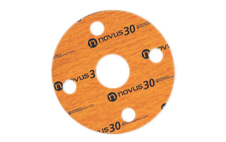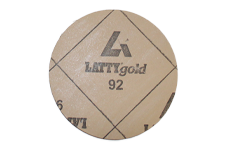
The ban on asbestos in the 1990s required industry to transition from asbestos-based gaskets to alternative sealing solutions. Historically, asbestos gaskets were widely specified in engines and heavy industrial systems, particularly high-pressure steam applications, due to their inherent thermal stability and sealing performance.
Today, advanced Compressed Non-Asbestos Fibre (CNAF) materials have become the standard. Manufactured by leading suppliers such as Klinger and Flexitallic, these materials typically comprise aramid, carbon, or glass fibres reinforced with rubber binders. The result is a high-integrity sealing medium designed to maintain flange face tightness and prevent leakage under demanding service conditions.
CNAF materials are available in a range of grades, tailored to meet specific requirements for temperature resistance, pressure containment, and chemical compatibility. This ensures reliable performance across diverse industrial applications.

The comprehensive range of Klinger compressed non-asbestos fibre (CNAF) materials is designed for a multitude of high-temperature applications.

Flexitallic's Novus range of compressed non-asbestos fibre (CNAF) materials can be configured for high-temperature and high-pressure applications, and steam, oils, fuels and acids.

Planichem's FLEXSEALS range of compressed non-asbestos fibre (CNAF) gasket sheet materials uses a versatile range of binding rubbers to provide maximum reliability and durability for critical sealing applications.

A flexible non-asbestos fibre (NAF) gasket material that is easy to cut, Latty Gold has very good resistance to mechanical, thermal and chemical loads.

A range of highly proven compressed non-asbestos fibre (CNAF) gasket materials made from aramid and glass fibres, and an NBR binder.

Garlock’s aramid-based compressed non-asbestos fibre (CNAF) sheet materials are fire-safe and provide excellent thermal stability in a range of applications.
We manufacture non-asbestos and compressed non-asbestos fibre gaskets as new or as replacements for existing asbestos material gaskets to suit the requirements of the customer. We use CAD design to create precision gasket profiles and cutting-edge manufacturing equipment to guarantee the accuracy of the finished gaskets over large or short runs.
Our experienced team can help clients with material specifications to meet the demands of a range of applications. We offer cost-effective manufacturing for small volume runs. All gaskets are supplied to recognised national and international standards.

Non-asbestos fibres include aramid, Kevlar and fibreglass. Aramid is often used for its excellent heat resistance and strength. The natural material is up to five times stronger than steel and twice the strength of glass fibre or nylon. It is also resistant to absorption and organic solvents, has good chemical resistance and low flammability.
Compressed non-asbestos gaskets are typically bound with elastomers such as nitrile, neoprene, or EPDM rubber, with each elastomer offering specific properties. For example, aramid fibres with a nitrile binder are a good choice for applications such as water and wastewater treatment, oil and gas production, food processing, pipe flange gaskets, and boiler gaskets.
| Materials | Temperature Range | PN Range | Download |
| Novus 30 | -100 to 225°C | 2.5/320 | Novus 30 datasheet |
| Novus 34 | -120 to 250°C | 2.5/320 | Novus 34 datasheet |
| Novus 48 | -40 to 100°C | 2.5/320 | |
| Novus 49 | -200 to 250°C | 2.5/320 | |
| Novus 10 | -200 to 260°C | 2.5/320 | |
| C4430 | -200 to 400°C | 2.5/320 | C-4430 datasheet |
| C4400 | -200 to 350°C | 2.5/320 | C-4400 datasheet |
| C4500 | -200 to 400°C | 2.5/320 | |
| C4324 | -100 to 300°C | 2.5/320 | C-4324 datasheet |
| Lattygold 92 | -50 to 440°C | 2.5/320 |
Our highly experienced technicians can advise you on the best sheet materials and manufacturing processes for a wide range of gasket applications.
NAF and CNAF gasket materials are widely used across industrial sectors for sealing flanged joints and preventing leakage of liquids and gases. Typical applications include pipelines, pumps, compressors, and valves handling steam, water, oils, hydrocarbons, and a range of process chemicals.
Their strength, thermal stability, and chemical resistance make them suitable for demanding environments in power generation, chemical processing, marine, and general manufacturing, where reliable and cost-effective sealing is essential.
We supply a vast range of gasket materials, available to buy directly or order from us. For more information visit the Gasket Sheet Materials page